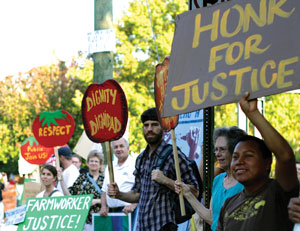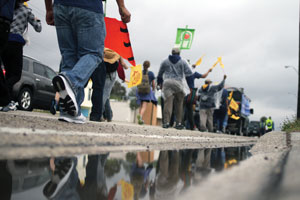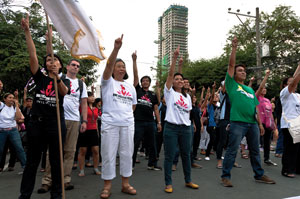‘The perpetual rule of love’
Creating effective, lasting social change is difficult; fortunately, you’re not alone.
by Rick Jones and Ginna Bairby

Presbyterians join the Coalition of Immokalee Workers to demand fair wages and human rights for farmworkers in the Florida tomato fields.
A year and a half ago, Colleen Earp sat in a room full of Young Adult Volunteers weary from an intense week of orientation and eager to start their year of service. Presbyterian World Mission would soon be placing each of them with a nonprofit or ministry somewhere in the United States or around the world. As Earp listened to her colleagues’ musings about a year of sharing the gospel and addressing injustice, she couldn’t help but laugh; she was thinking about planting trees.
Over the next year, Earp worked with First Presbyterian Church of Bayou Blue, Louisiana, as a wetlands conservationist and advocate in the New Orleans area. Before becoming a YAV, she had never laid eyes on a bayou. A year later, Earp had come to know the wetlands of Louisiana—and the church working to protect them—as her second home.
Working with the Presbyterian Hunger Program and Presbyterian Environmental Ministries, including their community of young adult eco-stewards, Earp raised awareness across the denomination about an increasingly dire situation. She also planted a lot of trees and grasses to help restore the coastline.

On a rainy day, farmworkers and their ecumenical allies, including Presbyterians, march for justice and dignity, asking grocery chain Publix to sign a fair food agreement.
Looking back, Earp realizes that much of her work as a YAV could be described as secular. That’s not how she experienced it, however. “Coastal restoration is an incredible and beautiful process,” she says. “In some ways, it embodies the processes of healing and resurrection toward which our Christian faith points us.” And throughout her entire year, Earp had the loving support of a Presbyterian congregation.
“Because of my involvement in conservation and advocacy,” she says, “I am feeling more excited about and connected to the church than I ever have before.”
Now the director of youth, environmental, and service ministries at Camp Hanover in Mechanicsville, Virginia, she continues her service to the church.
Service experiences like Earp’s are happening all across the Presbyterian Church (U.S.A.) thanks to a combined effort of various ministries, particularly in the Presbyterian Mission Agency’s office of Compassion, Peace, and Justice. Its ministries equip Presbyterians to respond to the needs of the world’s most vulnerable people, address injustice in all areas of life, and advocate for peaceful solutions to conflict.

During a Presbyterian Peacemaking Program travel seminar in the Philippines, participants dance in solidarity as part of the international One Billion Rising movement to end violence against women.
The ministry area takes its mandate straight from the Bible, including beloved passages such as Micah 6:8 and Jesus’ story of the sheep and the goats (Matt. 25:31–46). It also looks to the long history of advocacy in the Reformed tradition. Presbyterian forefather John Calvin himself described civic engagement as “by far the most sacred and honorable [calling] in human life” if it means ensuring that nations’ laws and actions are “in conformity to the perpetual rule of love.”
Presbyterian social witness efforts can be traced back as early as 1800, when the General Assembly established the denomination’s Committee of Mission. Its early missionary focus was on laborers and immigrants in crowded urban areas. Over the years, the justice ministry of the church has expanded to cover an ever-widening swath of issues and concerns.
All social justice ministries of the PC(USA) get their directive from policies passed by the elected members of the General Assembly.
Today, Compassion, Peace, and Justice reaches all aspects of human need—from hunger, social services, and disaster relief to environmental and legislative issues.
How can I get involved?
Check out the Compassion, Peace, and Justice homepage and subscribe to Unbound, an online social justice journal, to consider your options.
Many people find themselves asking: With so many important causes, how do I possibly know where to start? Should I work on national issues, international issues, or causes that are more local? How can my efforts make a difference?
Compassion, Peace, and Justice staff are here to help you navigate these steps, equip you with the resources you need, and connect you with others who have similar passions. It may look a little like this:
Choose: Listen for the cause or ministry that calls to you and start there—where your passion lies.
Connect: Follow a particular ministry on Facebook or Twitter. Check out action alerts, blogs, and e-newsletters. Call or email CPJ staff and ask how you can get involved.
Act: Do one thing. You could send a letter to Congress through the Office of Public Witness, participate in a webinar organized by the Presbyterian Hunger Program, register for Advocacy Training Weekend, or learn about a Self-Development of People project in your area.
What are my options?
The Advisory Committee for Social Witness Policy provides the General Assembly with careful studies on pressing moral challenges, discussion materials, and policy recommendations for faithful action.
Mission Responsibility Through Investment, a committee of the General Assembly, helps the church to act as faithful stewards of its investments by engaging corporations through correspondence, dialogue, and shareholder votes and resolutions.
Presbyterian Disaster Assistance is the emergency and refugee program of the PC(USA). It collaborates with congregations, mid councils, and nonprofits to facilitate the long-term recovery of disaster-impacted communities and provides training in disaster preparedness.
Learn more & give
To find Compassion, Peace, and Justice ministry opportunities and information: pcusa.org/cpj
To read cutting-edge, faith-based reflections on the most pressing issues of social justice today, including an article by former YAV Colleen Earp: justiceunbound.org
Social Media
Compassion, Peace, and Justice: facebook.com/presbyteriancpj and twitter.com/presbyteriancpj
Unbound: An Interactive Journal of Christian Social Justice: facebook.com/unboundjustice and twitter.com/unboundjustice
Donate
Designate your sustaining, multi- year gift to support a specific ministry of Compassion, Peace, and Justice: pcusa.org/give/E052168.
The Presbyterian Health, Education, and Welfare Association provides resources, peer support, and networking connections for Presbyterians involved with social welfare and justice ministries. Issues include disability concerns, HIV/AIDS, serious mental illness, addiction, child advocacy, reproductive options, specialized pastoral ministries, community transformation, and general health concerns.
The Presbyterian Hunger Program works with Presbyterians and other partners to alleviate hunger and eliminate its causes, responding with compassion and justice to poor and hungry people in communities in the United States and around the world. It also houses Presbyterian Environmental Ministries.
The Presbyterian Ministry at the United Nations equips Presbyterians to live as disciples of Jesus in the global community using seminars, social media, advocacy, teaching, and preaching.
The Presbyterian Office of Public Witness is the public policy information and advocacy office of the General Assembly. Staff members visit national policy makers, write letters, make phone calls, and testify before Congress or facilitate the testimony of church leaders.
The Presbyterian Peacemaking Program inspires and equips Presbyterians and partners to transform cultures of violence into communities of peace through conferences, travel study seminars, accompaniment opportunities, and direct action.
Self-Development of People equips Presbyterians and partners, through grants and community organizing, to join in the empowerment of economically poor, oppressed, and disadvantaged people, seeking to change the structures that perpetuate injustice.
Rick Jones is a mission communications strategist for the Presbyterian Mission Agency. Ginna Bairby is the managing editor of Unbound.
How to achieve social change
Faith-based community organizing is one of many models for creating change. Rather than simply uniting people around a common cause, faith-based community organizing looks to establish shared values and relationships, building a community organization of congregations and other faith-based groups.
By listening carefully, identifying neighborhood issues before addressing broader issues at a state or national level, training leaders, and organizing public actions, this model seeks to create lasting change—led by those most likely to benefit from the change.
There are four basic steps:
1. One-on-ones: The most critical aspect of community organizing, one-on-ones involve listening to members of a community in order to identify issues, solutions, and potential leaders rather than having a few (often privileged) advocates determine needs and answers in a vacuum.
2. Research: After identifying a need, do your homework. Conduct more one-on-ones, especially with anyone involved in the issue. Consult experts. Build relationships with relevant officials.
3. Action: Only after talking with all interested parties and having conducted extensive research should you devise proposals or solutions. Now, organize an action. Invite your community, organization members, and relevant officials. Demand public responses from those officials at the action.
4. Evaluation: Review how the action went—its successes and its failures. Based on this information, begin again at step one.
Think of these steps as a circle; you always return to one-on-ones—to listening, leadership development, and forming relationships.
Check out the following titles for more about community organizing:
Blessed Are the Organized: Grassroots Democracy in America by Jeffrey Stout (Princeton University Press, 2010)
Dry Bones Rattling: Community Building to Revitalize American Democracy by Mark Warren (Princeton University Press, 2001)
Reflecting with Scripture on Community Organizing by Jeffrey Krehbiel (ACTA Publications, 2010)
Streets of Glory: Church and Community in a Black Urban Neighborhood by Omar McRoberts (University of Chicago Press, 2005)
You can also find a number of community organizing resources at piconetwork.org and industrialareasfoundation.org.


